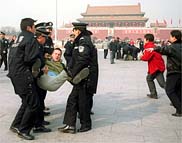|
| |||||
|
|
|
|
|
| |
|
|
|
| |||
|
|
|
| |||
|
| |||||
|
| |||||
February 14, 2002
Foreign Followers of Falun Gong Held by Police in Beijing Protest
By ERIK ECKHOLM
|
|
|
 EIJING, Feb. 14 — More than 40 Western followers of the outlawed Falun Gong spiritual movement were detained here today after they staged protests on Tiananmen Square.
EIJING, Feb. 14 — More than 40 Western followers of the outlawed Falun Gong spiritual movement were detained here today after they staged protests on Tiananmen Square.
Small groups of demonstrators unfurled yellow banners, shouted "Falun Gong is good!" and ran across the giant square, which was filled with Chinese tourists here for the Chinese New Year holiday, or Spring Festival, according to witnesses and a government report. All were captured by the police during the 20-minute protest, some after being wrestled to the ground and kicked or punched, witnesses said.
Earlier today, a group of 14 European Falun Gong believers who had come to protest were arrested by the police in their hotel rooms, according to Falun Gong spokesmen in New York. The demonstrations, coming a week before President Bush is to visit Beijing, are intended to dramatize China's harsh persecution of the movement's followers.
The official Chinese news media briefly reported on the detentions, saying, "This turmoil at the center of the Chinese capital was aimed to undermine the happy atmosphere of the Spring Festival."
No breakdown was immediately available of the nationalities of those detained today, though a Falun Gong spokesman in New York said it included several Britons. On Monday a Canadian and an American follower were arrested after demonstrating on Tiananmen Square and the next day they were deported.
According to international rights groups, thousands of Chinese believers in Falun Gong have been sent to "re-education through labor" camps since the group was banned in 1999 and more than 100 have died in police custody.
In a written statement today, Levi Browde, the American who was deported this week, said, "We go to Tiananmen Square with the hope that our peaceful appeal will bring an end to the torture and murder of innocent people."
Falun Gong, developed by a former clerk named Li Hongzhi, combines Buddhism and Taoism with elements of traditional Chinese qigong exercises, which are said to marshal supernatural forces to achieve physical and spiritual well-being. In the late 1990's, millions of Chinese were attracted to the movement and practiced their slow-motion rituals in urban parks.
In the late 1990's, as branches of the group came into conflict with the police, Mr. Li moved to the United States. Now accused by the Chinese government of fraud and of responsibility for the deaths of gullible believers who avoided medical care, Mr. Li has continued to provide guidance to the faithful over the Internet.
In 1998 some 10,000 followers from several provinces gathered in Beijing and staged a surprise protest around the leadership compound at Zhongnanhai, demanding official recognition for the movement. Officials were clearly startled by the illegal gathering and later denounced Falun Gong as an "evil cult" and began arresting its leaders.
For many months, persistent followers from around the country traveled to Beijing to protest the ban, but the authorities only intensified the crackdown, often trampling on individual legal rights in the process, according to international monitors.
Gradually, protests by the Chinese tapered off, in part because so many followers had been sent to labor camps or lost their jobs or housing. Foreign members have sporadically entered China to hold protests, aiming to keep the world's attention on China's suppression of the movement.
